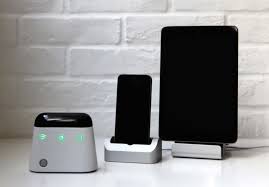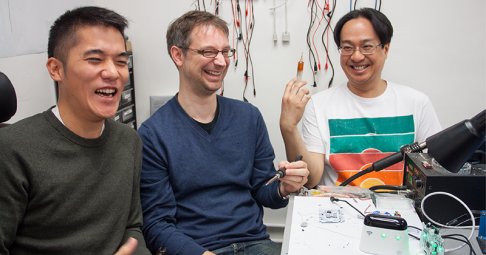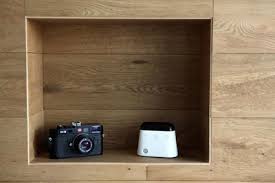A device that can reduce air conditioning energy consumption by up to 30 per cent, Ambi Climate is the product of a Hong Kong startup

The smartphone-controlled Ambi Climate, which can be linked up with an air conditioning unit via infrared sensor. Photo: Ambi Labs.
Its a common predicament in Hong Kong - walk along one of the citys crowded streets, and sooner or later youre bound have a few unwelcome water droplets splash on your head.
The culprit? An overhanging, overworked air conditioning unit.

Hongkongers are strongly reliant on air conditioning, and this is especially noticeable in the hot summer months when falling AC condensation is most common. With indoor temperatures cranked to frigid degrees only to be switched off and then back on again when users get too cold or hot, AC usage in the city often wastes both energy and money.
Enter Ambi Climate, a smart air conditioning product devised by Hong Kong startup Ambi Labs.
Essentially a smartphone controlled device, Ambi Climate comes with learning technology that can interact with an air conditioning unit via infrared sensor, analyse a users AC habits and predict the most appropriate settings accordingly.

In a typical Hong Kong household, AC is used the most between 8pm and 8am, says one of the founders of Ambi Labs, Hongkonger Julian Lee. Hypothetically, an Ambi Climate user can set a timer indicating that he will be home by 8pm, and the device will select the right time and settings to switch on the AC so that the conditions are within the user's range of comfort preferences when he gets home.
The system can also automatically adjust the AC to take care of changing weather conditions
Perhaps, during the weekend, there is a thunderstorm outside, and conditions outdoors suddenly drop by a few degrees. This would result in the room getting suddenly colder, but Ambi Climate would notice this and preemptively adjust the AC to keep conditions comfortable.
Watch: How Ambi Climate works
According to studies by Ambi Labs testers, if room temperatures are sustained at a more even and natural level, up to 30 per cent of AC energy consumption can be reduced.
This can result in savings of up to HK$200 per month for a typical household, [since] the air conditioner [usually] accounts for up to 50 to 60 per cent of the household's electricity bill," Lee says. "Over summer the bill can total around HK$1,500 for a typical family, or as much as HK$6,000 for extravagant users.
Currently raising funds on Crowdtivate, a Singaporean site designed for Asian startups, Ambi Climate is not the first smartphone-enabled air conditioning controller. Other companies, such as Germany-based Tado, have also developed similar intelligent climate control apps.

But Ambi Climate is one of the first devices specifically targeting not only Hong Kong, but most of Asia - including Taiwan, Japan, Korea, Malaysia, Singapore, Thailand, Indonesia and Australia. The Ambi Labs team has spent the last two years surveying 4,000 consumers from these regions on their air conditioning habits.
As we did this research
a common [complaint] that we identified was the inability of ACs to maintain comfortable conditions, Lee says. For example, some users complained about fiddling with their AC remotes as much as every 30 minutes, while others complained about waking up cold in the middle of the night. Still others wished for an AC that could automatically turn up the heating on a particularly cold winter day.
We identified this as a real pain point to the Asian consumer
and made our main focus AI controlled comfort that would be able to account for changes due to different times of day, different outdoor weather and changing user preferences.

Ambi Labs founders. From left to right: Timothy Chang, Paul Sykes and Julian Lee. Photo: Ambi Labs
Originally inspired to create Ambi Climate after struggling to find a suitable air conditioned environment for his pet husky, Lee left a 13-year career in business management to found Ambi Labs in 2012 with two partners, Timothy Chang and Paul Sykes. The company currently employs eleven people and is preparing 500 test units that will go into production in 2015.
While startup culture is not as widespread in Hong Kong as it is in the West, Lee argues that the city holds considerable potential for entrepreneurs willing to tackle local problems, such as dripping air conditioner condensation.

Hong Kongs advantages are in its international exposure and in the opportunities [Hongkongers] have to identify regional trends, Lee says. These insights are harder for those with less international exposure to tap
and also much harder for people in the United States and Europe [to obtain]. There are pan-Asian challenges that can be solved by people seeking to understand them.
Source

 |